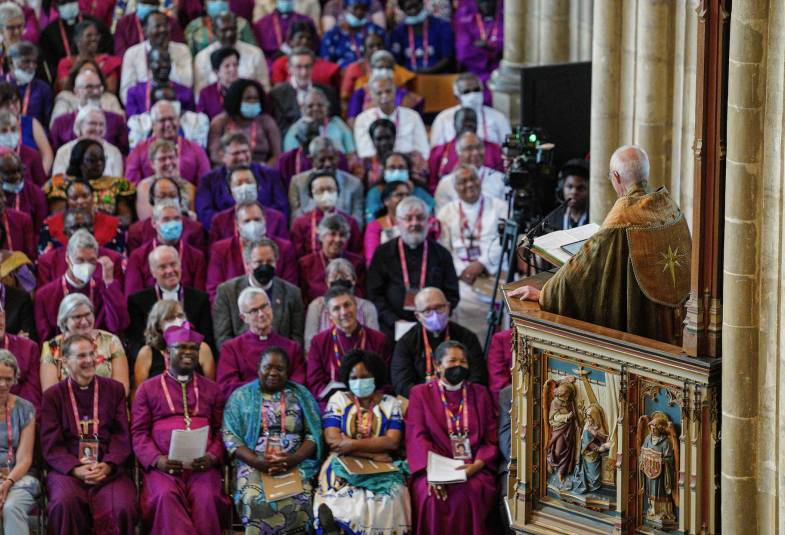
The Anglican Communion is one of the world’s largest global Christian denominations, consisting of tens of millions of Christians who are members of 46 different Churches. These make up 42 member churches (also called provinces) and five other national or local churches known as Extra Provincials, spread across the globe. Each province is autonomous, with its own system of governance. The most senior of the bishops or archbishops in each province are known as "Primates".
The Anglican Communion is not held together by a formal constitution or international church law, but rather by a shared heritage, by ways of worshipping and by the relationships – the "bonds of affection" – between its members worldwide. These are strengthened when Anglicans meet, informally and at such formal gatherings as the Instruments of Communion. The President of these Instruments is the Archbishop of Canterbury who acts as a unique focus of unity.
The Archbishop of Canterbury also plays a leading role in nurturing the interdependent life of the Anglican Communion by visiting Provinces, arranging meetings, helping initiatives, and contributing to theological reflection.
In his ministry across the Anglican Communion, the Archbishop is supported by dedicated staff at Lambeth Palace as well as the Secretary General of the Anglican Communion and his staff at the Anglican Communion Office in London, England.
The Lambeth Conference is an international meeting of Anglican bishops, held around every ten years, to discuss church and world affairs and the global mission of the Anglican Communion for the decade ahead.
History of the Anglican Church
Anglicans trace their Christian roots back to the early Church, and their specifically Anglican identity to the post-Reformation expansion of the Church of England and other Episcopal or Anglican Churches. Historically, there were two main stages in the development and spread of the Communion. Beginning with the seventeenth century, Anglicanism was established alongside colonisation in the United States, Australia, Canada, New Zealand and South Africa. The second stage began in the eighteenth century when missionaries worked to establish Anglican churches in Asia, Africa and Latin America.
As a worldwide family of churches, the Anglican Communion has tens of millions of members in 40 Member Churches (also called Provinces) spreading across over 165 countries. Located on every continent, Anglicans speak many languages and come from different races and cultures. Although the churches are autonomous, they are also uniquely unified through their history, their theology, their worship and their relationship to the ancient See of Canterbury.
Anglicans uphold the Catholic and Apostolic faith. Following the teachings of Jesus Christ, the Churches are committed to the proclamation of the good news of the Gospel to the whole creation. In practice this is based on the revelation contained in Holy Scripture and the Catholic creeds, and is interpreted in light of Christian tradition, scholarship, reason and experience.
By baptism in the name of the Father, Son and Holy Spirit, a person is made one with Christ and received into the fellowship of the Church. This sacrament of initiation is open to children as well as to adults.
Central to worship for Anglicans is the celebration of the Holy Eucharist, also called the Holy Communion, the Lord's Supper or the Mass. In this offering of prayer and praise, the life, death and resurrection of Jesus Christ are recalled through the proclamation of the word and the celebration of the sacrament. Other important rites, commonly called sacraments, include confirmation, holy orders, reconciliation, marriage and anointing of the sick.
Worship is at the very heart of Anglicanism. Its styles vary from simple to elaborate, or even a combination. Until the late twentieth century the great uniting text was The Book of Common Prayer, in its various revisions throughout the Communion, and the modern language liturgies, such as Common Worship, which now exist alongside it still bear a family likeness. Both The Book of Common Prayer, and more recent Anglican liturgies give expression to the comprehensiveness found within the Church whose principles reflect that of the via media in relation to its own and other Christian Churches.
Another distinguishing feature of the corporate nature of Anglicanism is that it is an interdependent Church, where parishes, dioceses and provinces help each other to achieve by mutual support in terms of financial assistance and the sharing of other resources.
To be an Anglican is to be on a journey of faith to God supported by a fellowship of co-believers who are dedicated to finding Him by prayer and service.